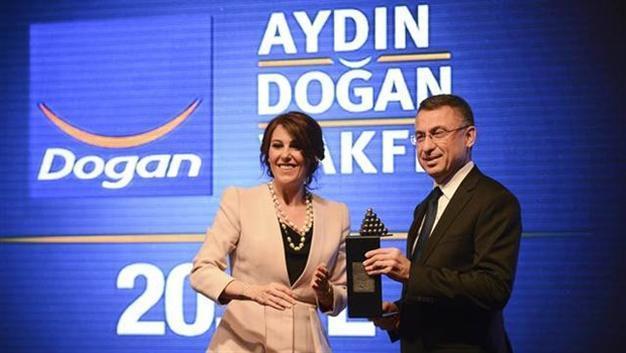Disaster agency receives 20th Aydın Doğan Award in ceremony
ISTANBUL
 Turkey’s Disaster and Emergency Management Authority (AFAD) has received the 20th Aydın Doğan Award in a ceremony held in Istanbul, marking the first instance of a state institution being recognized by the Aydın Doğan Foundation.
Turkey’s Disaster and Emergency Management Authority (AFAD) has received the 20th Aydın Doğan Award in a ceremony held in Istanbul, marking the first instance of a state institution being recognized by the Aydın Doğan Foundation. “For 20 years, the Aydın Doğan Award has been issued to successful individuals and institutions in the fields of culture, arts, literature and science. This year, we wanted to award an institution which glorifies humanitarian values,” Aydın Doğan Foundation President Hanzade Doğan Boyner said in her address to guests at the award ceremony on late on May 4.
Doğan Boyner underlined that AFAD was an “exemplary success story” with its organizational achievements in hosting millions of refugees fleeing the civil war in Syria.
“This good example also demonstrates the importance of Turkey’s qualified workforce and institutions which adopt scientific methods,” Doğan Boyner said, adding one of their aims in awarding AFAD was putting the disaster agency’s work under the spotlight in Turkey and abroad.
The foundation’s president also criticized the “hypocrisy” displayed by Europe in its attitude towards refugees and called on European states to share the burden, which Turkey has so far been undertaking single-handedly.
Doğan Boyner later handed the award to AFAD President Fuat Oktay, who, in return, extended his gratitude to members of the Aydın Doğan Foundation for being aware of the agency’s work and trying to raise awareness around it.
Oktay stressed that although AFAD was a nascent institution founded some five years ago, it was in fact built upon knowledge and experience accumulated over many years in different state institutions operating under various ministries.
“AFAD was formed in 2009 and became operational in 2010 due to problems in coordination among institutions operating under different ministries at times of crisis and urgency,” Oktay explained.
The president underlined the importance of clearly outlined duties in running such an extensive organization, saying “doing one’s best” led to chaos and rising expenses which in turn led them to change the system of operation.
“One of the most important factors distinguishing developed states from underdeveloped or developing countries, is disaster management,” Oktay said.
“We no longer want people to do their best. We want to do the best with their task,” he added, underlining the necessity for Turkey to make the best use of its limited resources by coordinating efforts in public institutions, the private sector and civil society organizations.
Oktay also explained AFAD’s ongoing projects, including the creation of a risk map listing possible risks across Turkey’s 81 provinces, conducting risk analyses and prioritizing the items to prepare response scenarios.
The AFAD head also underlined the organization’s efforts to assist Syrian refugees, including an intake of a total 200,000 refugees in just three days, and to respond to crises across the world.
“Today we are in Ecuador, yesterday we were in Nepal. The day before, we were in the Philippines and we arrived at the latter’s disaster region before the state’s own disaster agency or the United Nations,” he stated.
An organization reporting to Turkey’s Prime Ministry, AFAD had won the prestigious U.N. Public Service Award in 2015 with its Temporary Urban Management System (AFKEN).
The Aydın Doğan Award has been issued since the foundation’s establishment in 1996 and aims to encourage and reward individuals who have committed their careers to contributing to humanity in the fields of arts, science and culture.
To date, the award has been issued to individuals and institutions who have excelled in, or contributed significantly to, fields such as novel writing, social sciences and the humanities, visual arts, poetry, history, music, archaeology and architecture.
Last year’s award was presented to Turkish Nobel Laureate writer Orhan Pamuk for “masterfully bringing together the Eastern and Western poles and being one of masters representing Turkish novels in the world.”
















